|


Like us on Facebook!
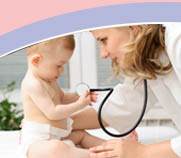
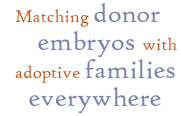
|  |
  |
|
Books on Egg,
Sperm, Surrogates, and Embryo Donation
|
Embryo Donation And Embryo Adoption
by
John D. Van Regenmorter,
Slyvia A. Van Regenmorter
Synopsis: Can one couple's dilemma be the answer to another couple's
hopes and dreams? Yes! If you are a couple with precious, frozen
embryos, this book provides Christian-based guidance on the loving,
life-affirming option of embryo donation. If you are a couple who is
longing to have a baby, this book will help you consider the
adventure of a lifetime-becoming parents through embryo adoption.
Sensitively written in an easy-to-read style, this book is a
must-read for those interested in learning more about new
opportunities in embryo donation and embryo adoption.
MORALITY OF EMBRYO ADOPTION
Synopsis: What
should we do with the hundreds of thousands of frozen human embryos
held in fertility clinics around the world? One solution would be
adoption. Would such a course of action be moral? That is the
question faced in this volume. The leading thinkers in Catholic
bioethics divide into two opposing camps in a great debate over
biotechnology, sexuality, marriage, and the right to life.
Soul of the Embryo:
Christianity and the Human Embryo
by
David Albert Jones
| NEW - Article - Egg Donation - Reproduction
- In Vitro Fertilization - Infertility - Women - Peggy Orenstein -
New York Times July 15 2007 |
|
Your Gamete, Myself
The author Peggy Orenstein is a contributing writer for the NYT
and author of the memoir, “Waiting for Daisy: A Tale of Two
Continents, Three Religions, Five Infertility Doctors, an Oscar, an
Atomic Bomb, a Romantic Night and One Woman’s Quest to Become a
Mother. |
| NEW - Creating Life Against the Odds: The
Journey from Infertility to Parenthood by Ilona Laszlo Higgins MD,
FACOG published by Higgins 2006 |
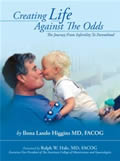 This
is a self published book from a probably not very typical American
Gynaecologist/Obsterician who chose to conceive a third child in her
late forties using a known egg donor. She draws on extensive
material from her experience of helping others with fertility
problems as well as relating with humour, empathy and authenticity
the see-sawing emotions (particularly of ambivalence) around using a
donated egg to help complete her family. There is a good section at
the end where she castigates her fellow clinicians and others for
inaccurate and euphemistic use of language. This
is a self published book from a probably not very typical American
Gynaecologist/Obsterician who chose to conceive a third child in her
late forties using a known egg donor. She draws on extensive
material from her experience of helping others with fertility
problems as well as relating with humour, empathy and authenticity
the see-sawing emotions (particularly of ambivalence) around using a
donated egg to help complete her family. There is a good section at
the end where she castigates her fellow clinicians and others for
inaccurate and euphemistic use of language.
2 copies in the library and to buy from www.LonnyHiggins.com |
| Mommies, Daddies, Donors, Surrogates: Answering
Tough Questions and Building Strong Families Diane Ehrensaft, Ph.D
Published in the USA by Guildford 2005-11-09$16.95 (£9.50) from
Amazon.com or the web site of the publisher. |
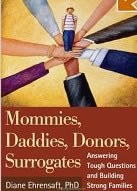 2
copies in the DCN Library 2
copies in the DCN Library
Don't be put off by the rather 'American' title of this book. It is
well worth reading for both those contemplating family building by
donor conception and those who are already parents, whether in
heterosexual or lesbian couple or single parent families. As a
developmental psychologist Diane Ehrensaft is able to address and
empathise with all the complicated thoughts and feelings of would-be
parents whilst keeping a strong focus on the developmental needs of
the children. The chapters on the why, how and when of ‘telling’
are some of the best material around.
Review
Diane Ehrensaft brings the insight of a clinical and developmental
psychologist to all the big questions that arise both before family
creation with donor conception and afterwards. Luckily she
communicates them in language that is a pleasure to read and
accessible to all who enjoy getting information from books. Using
examples from her experience of two decades of working with families
built through assisted conception, she addresses not only the
obvious feelings and practicalities faced by would-be parents, but
also some of the more difficult emotions and fantasies that are
often around but rarely spoken about. All this is undertaken with
great empathy for the would-be parent(s), be they heterosexual or
lesbian couples or single women, but with the focus squarely on the
developmental needs of the child.
Through a Freudian typological error she came upon the term Birth
Other (mother) and decided that this was indeed a helpful way to
think about the donor. Whilst remaining outside the parenting circle
he or she is nevertheless a significant other in the creation of a
child. A firm proponent of 'telling' as a process, Ehrensaft goes
through the arguments for starting to share information at different
ages and stages and comes down in favour of starting either in
infancy or when a child starts asking questions about babies. The
chapters on the why, how and when of 'telling' are some of the best
material I have ever read on the subject - partly because of the
emphasis on children's developmental stages but also because of the
examples and the reassurance that 'getting it wrong' sometimes is
unlikely to do lasting damage. And unlike other American 'experts'
she is refreshingly undogmatic about the use of correct anatomical
terminology, favouring 'tummy' over 'uterus' when explaining where
babies grow to young children.
In conclusion, I thoroughly endorse the review by Anne Bernstein,
author of The Flight of the Stork, who wrote 'This is the first book
to map the emotional terrain of parenthood that is aided by a 'birth
other', the author's inventive term for a donor or surrogate….wise,
highly readable and insightful, this is an essential guide '.
Olivia Montuschi |
|
Having Your Baby Through Egg Donation By Ellen
Sarasohn Glazer and
Evelina Weidman Sterling Published by Perspectives Press 2005 |
The first really comprehensive book
for individuals and couples considering egg donation is published in
the USA in April. Although some parts of this American book are not
relevant to the UK situation, all the emotional and ethical issues
are familiar and covered in depth. Highly recommended.
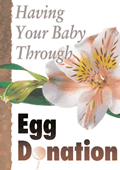
Reviewed by Deborah Weinberg, member of DC Network
Important new book for all contemplating egg donation or parenting
children conceived this way. The authors of this book are well known
and well respected practitioners and writers in the field of
infertility.
What they have produced together is the ultimate guide book on egg
donation. As well as tremendous knowledge and experience, it also
displays great compassion.
This is the most comprehensive book on the subject that I have come
across, covering every possible practical question and circumstance,
as well as all the emotional and ethical issues and decisions. No
choice or issue is left unexplored.
Egg donation is weighed up against all other options, including
continuing to try on your own, (with or without IVF), embryo
donation, adoption or doing nothing further. Domestic, international
and transracial adoptions are looked at. The merits of all kinds of
donors and donation are discussed: intrafamily, friend-to-friend,
clinic recruited, recipient recruited, known, anonymous and so on.
Many other important issues - such as multiple births, pregnancy
loss, age, coming to terms with childlessness, accepting a one-child
family - are presented and discussed.
In addition, the authors provide notes on additional resources -
websites and books - for the reader to pursue. To illustrate each
dilemma or situation, Glazer and Sterling introduce us to the
stories of many different women and couples facing difficult
decisions. Their stories are real and very moving, and they help to
convince us that we are not alone on this journey. If you have
confronted similar issues, you can easily identify with some of
these families.
I found that they even triggered some dormant emotions, those not
quite yet given voice to. Being written from a US viewpoint, there
are sections of the book with little or no obvious relevance to the
UK, for example "Choosing your donor", "Choosing a fertility clinic
and assembling the medical team" or "Lawyers and Mental health
counselors". Nevertheless, within these fascinating chapters are
useful pointers to consider and more case studies with which to
identify. Clearly, infertility counselors are more abundant and
long-term counselling more culturally acceptable in the US.
The authors advise against thinking one can go it alone, and
encourage the reader to undertake this often fraught journey with
the support of an experienced counselor. Some of the areas that
they suggest can usefully be explored in counselling are: loss and
grief, letting go and moving on, ambivalence about one's decision,
feelings of failure, renewed grief if treatment doesn't work,
feeling a 'fake' during pregnancy and so on.
Glazer and Sterling are unashamed advocates of telling children the
truth of how they entered their families - "why would you lie to
your children?" they ask. They utterly reject the use of the word
"disclosure", with its taint of shame and secrecy. If your child
comes into your family through egg donation, it may not have been
your first choice but what a wonderful positive story to celebrate,
they say. The authors talk also of "collaborative reproductive
options". I found it refreshing to be reminded of what a
collaborative undertaking egg donation is; and refreshing that the
feelings of the donor, and sometimes the donor's family, are also
acknowledged and explored.
This is not a book needing to be read cover to cover, but it is not
difficult to find sections, chapters and stories relevant to ones
own situation. Each new issue is clearly signposted, and the
authors' style is easy, reassuring and accessible. They write with
great empathy, drawing not only on their own wealth of knowledge and
experience, but also on cohorts of other professionals in this field
in the US.
I hope this book finds its way to every clinic in the UK and to
every woman or couple navigating a path through the maze of emotions
towards parenthood through egg donation.
This is an American book that in most respects is absolutely
relevant for couples in the UK contemplating egg donation.
This book is available at a very good price from Amazon.co.uk and
Amazon.com
Download the Official Flyer for book ( PDF )
|
|
BUILDING YOUR FAMILY THROUGH EGG DONATION (1996) by
Joyce Sutkamp Friedeman ISBN: 0964595214 Published by Jolance Press
Covers issues such as donor selection, will you are able to bond
with your child, and what is an appropriate level of privacy and
secrecy. Also includes a section on how to explain egg donation to
children of different ages. |
EGG DONATION (1997) by Tim Appleton A booklet published by the IFC Infertility Resource Centre in
Cambridgeoutlines the implications of treatment for family and
child, confidentiality, legal issues and telling the child or not.
Books by the same author to help tell children about their origins
are listed in the children's book section of this resource guide.
DONOR CONCEPTION BOOKS
FOR PARENTS
Compiled by the Education Committee, Spring 2007
Kim Kluger-Bell, MFT, Chair
Jana Frances Fisher, Ph.D.
Jennifer Adams, Ph.D.
Mental Health Professional Group
American Society for Reproduction Medicine
(Based on the
Children’s Bibliography
compiled by Elaine Gordon, Phd, and Ellen Speyer, MFT)
Bernstein, Anne (1994)
Flight of the Stork: What Children Think (And When) About Sex and
Family Building 287 p. Indianapolis: Perspectives Press.
Available through
amazon.com or
www.perspectivespress.com.
Enlightening interviews with children aged 3-12 provides insight into the
minds of young children and how their concepts and questions about
sex and reproduction change over time. This updated version includes
references to donor insemination, assisted reproductive technology
and surrogacy. Valuable resource for parents in communicating with
their children about the special circumstances of their origins.
Cooper, S. and Glazer, E. (1999) CHOOSING ASSISTED REPRODUCTION:
SOCIAL, EMOTIONAL, AND ETHICAL CONSIDERATIONS Indianapolis:
Perspectives Press. 400p. Available on line through booksellers or
through
www.perspectivespress.com.
Comprehensive overview of IVF, GIFT,
ZIFT, ICSI, ovum donation, sperm donation, surrogacy, gestational
care, and embryo donation which helps fertility patients think
through the psychological, social and ethical implications of these
procedures. Suggestions on how and when to tell children about their
origins is included.
Daniels, Ken. BUILDING A FAMILY
WITH THE ASSISTANCE OF DONOR INSEMINATION
Donor Conception Network. TELLING AND TALKING
Ehrensaft, Diane. (2005) MOMMIES, DADDIES, DONORS, SURROGATES:
ANSWERING TOUCH QUESTIONS AND BUILDING STRONG FAMILIES Guilford
Press. 305p. Highly comprehensive book on the in's
and outs of the kinds of issues faced by families of third party
reproductive technology. Excellent sections on how, when, and what
to tell your children. Some fertility patients have been overwhelmed
by the scope of the book.
Friedman, J.S. (1996) BUILDING
YOUR FAMILY THROUGH EGG DONATION
–WHAT YOU WILL WANT TO KNOW
ABOUT THE EMOTIONAL ASPECTS,
BONDING, AND DISCLOSURE ISSUES
Kentucky: Jolance Press.
This book is available through the author.
The most
thorough exploration of the medical, ethical, and psychological
aspects of egg donation currently in print, including sections on how, when, and
who to tell.
Glazer, Ellen. (1998) THE LONG AWAITED STORK: A GUIDE TO
PARENTING AFTER INFERTILITY Jossey Bass Press. 349p. Available
through booksellers on line.
One of a kind resources for
parenting after infertility including sections on what (and when) to
tell your child about their conception and/or birth, who else to
tell, and how to handle lingering feelings of loss. Appropriate for
parents of adopted children; sperm donor, egg donor parents; parents who used surrogates;
parents of special needs kids; and parents raising children
conceived in different ways.
Lorbach, Caroline. (2003)
EXPERIENCES OF DONOR CONCEPTION; PARENTS, OFFSPRING, AND DONORS
THROUGH THE YEARS New Zealand: Jessica Kingsley Publishers. 208
p. Available through
amazon.com. Fascinating exploration of using donor conception
(egg donation, sperm donation, embryo donation), which draws heavily
on first hand experiences of
parents, offspring and donors and includes the author’s own family
story. Special emphasis on how and when to tell children and
“real life” examples of family’s experiences. Strongly supportive of
open-ness with children.
Pettle, S. and J. Burns. CHOOSING
TO BE OPEN: THE EXPERIENCES OF PARENTS Donor Conception Network,
U.K. Available through
www.donor≠conception-network.org.
Short book consisting of
conversations with 52 parents who participated in group discussions
to talk about their experiences being open about donor conception.
Available through
www.donor-conception-network.org.
Excerpted from ASRM website Dec 28, 2008
-----------------------------------------------------------------------------------------------------------------------------------
DONOR CONCEPTION NETWORK BOOKLETS
http://www.donor-conception-network.org/tellandtalk.htm
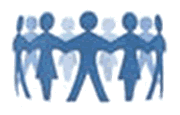
HOW TO TELL PROJECT - TELLING AND TALKING MATERIALS - FOUR BOOKLETS
AND A FILM ...
A set of unique resources for parents of donor conceived children
and the professionals who support them.
Pre-I.V.F. Planning Packet
Mommy, Did I Grow in Your Tummy? Where Some Babies Come From
By Elaine R. Gordon
Explains infertility, IVF, and all the ways of becoming a family, including donor sperm, donor egg, and surrogacy. (ages 4 and up)
Santa Monica: E.M. Greenburg Press, 1992.
Available through Amazon.com
How Babies and Families Are Made: There Is More Than One Way!
By Patricia Schaffer
Combines basic sex ed about anatomy, conception, pregnancy, and childbirth with an explanation of family-building that includes adoption, donor insemination, and IVF. (ages 5-9)
Tabor Sarah Books, 1988.
Available through Amazon.com
I’m a Little Frostie
By Tim Appleton
An easy to read book, which is full of color pictures. It is about a child conceived from a frozen embryo that was thawed, transferred and successfully resulted in a birth. It is suitable for children who were created from donated embryos.
Published by the IFC Resource Centre.
Purchase here
Third Party Reproduction:
– Donor Sperm
Let me explain: A story about donor insemination
By Jane T. Schnitter, Joanne Bowring
A little girl explains how she was conceived through artificial insemination and that although she has genes from her mother and a donor, her dad is her only father.
Published Date: December 1995 Hardcover
Available through Amazon.com
My Story
Excellent for young children, this straightforward and gentle guide describes how Mummy and Daddy conceived their child through donor insemination. (ages 4-7)
London: Infertility Research Trust/Jessup Hospital for Women, 1991.
Purchase here
– Donor Eggs
Sometimes it takes Three to Make a Baby: Explaining Egg Donor Conception to Young Children
By Kate Bourne Illustrated by Don Thompson
This Australian book includes an illustrated story for young children explaining in simple language the process of egg donation. There is also a workbook called “My Very Own Book About Me” for the child to complete, and advice for parents on talking to young children about their special conception. It will also be of interest to egg donors and their families.
2002 Published by Melbourne IVF Pty Ltd.
Purchase here
– Adoption
Happy Adoption Day!
By John McCutcheon, Julie Paschkis (Illustrator)
Noted folksinger John McCutcheon has written a joyful song commemorating the wonderful day when a child joins an adoptive family. Read or sung, the excitement and love of new parents rings through in these heartwarming verses that reassure adopted children that they are wanted, loved and very special. Complete with musical notation, this is the perfect gift for adopted children and their families to share. Full color.
Available through Amazon.com
Seeds of Love: For Brothers and Sisters of International Adoption
By Mary Ebejer Petertyl, Jill Chambers (Illustrator)
When my husband and I were preparing to travel internationally to adopt our daughter Anna, I worried about how our four-year-old daughter Carly would handle our extended separation. I looked for, but could not find, a book like Seeds of Love. As a professional writer and editor, I naturally felt compelled to address this void in the children’s adoption literature — and Seeds of Love was born!
Purchase here
Embryo's Alive
P.O. Box 42841
Cincinnati, Ohio 45242-5020
E-mail: EmbryosAlive@yahoo.com
Hours 9:30 to 4:30 Monday–Friday Eastern Standard Time
Phone: 513-518-7006 Fax: 727-489-2427
|
|
|


